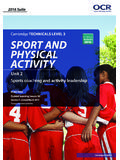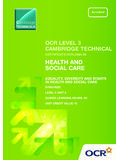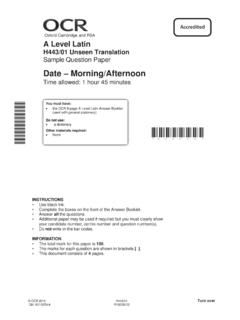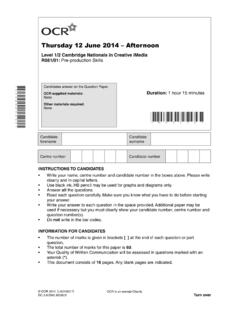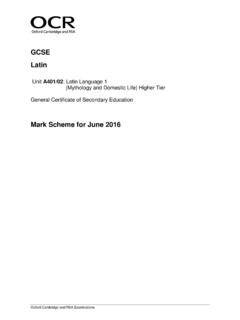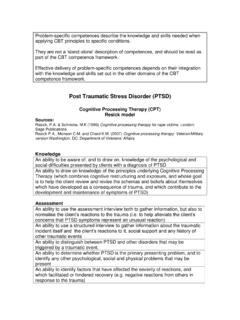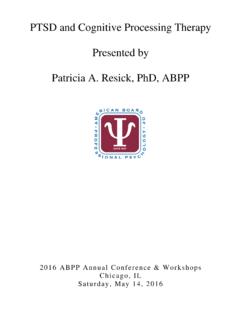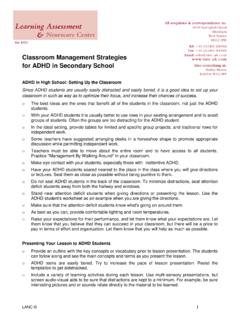Transcription of Delivery Guide SOCIOLOGY - ocr.org.uk
1 QualificationAccreditedA LEVELD elivery GuideSOCIOLOGYH580 For first teaching in 2015 Theme: Globalisation and the digital worldVersion Page 3 Curriculum Content Page 4 Thinking conceptually Page 6 Thinking contextually: activities Page 8 Thinking contextually: suggested answers to student resource sheets 1, 2, 4, 5 and 7 Page 25 References Page 34A LEVELSOCIOLOGY3 Delivery guides are designed to represent a body of knowledge about teaching a particular topic and contain: Content: A clear outline of the content covered by the Delivery Guide ; Thinking Conceptually: Expert guidance on the key concepts involved, common difficulties students may have, approaches to teaching that can help students understand these concepts and how this topic links conceptually to other areas of the subject; Thinking Contextually: A range of suggested teaching activities using a variety of themes so that different activities can be selected which best suit particular classes, learning styles or teaching approaches.
2 If you have any feedback on this Delivery Guide or suggestions for other resources you would like OCR to develop, please email ContentThis Delivery Guide focuses on introducing learners to the Component 3 theme of globalisation which runs through both compulsory and option topics. This compulsory section, globalisation and the digital social world, focuses on two key questions:1. What is the relationship between globalisation and digital forms of communication? Learners should actively consider various definitions of globalisation and consider the challenges involved with defining the concept Learners need to understand that the concept of globalisation is explored and used in a wide range of non sociological ways, in other disciplines and in wider society.
3 However, students should be aware of the specific sociological use of the term Learners should consider theoretical interpretations of digital forms of communication. As well as this students should develop their ideas and evaluate how useful classical social theories are in understanding very new phenomena Learners should explore the issue of access to digital communication locally and globally as well as patterns of access and use. This can be done by considering the concept of social capital, as well as considering the response of the state in regulating and managing such new forms of communication Learners should develop an understanding of the impact digital communications have had on relationships; to what extent have digital forms of communications increased the number of relationships we have, and what impact have digital forms of communication had on the quality of relationships, thinking about whether relationships are superficial or meaningful.
4 Learners should also think about the variety of opportunities digital forms of communication have Content2. What is the impact of digital forms of communication in a global context? Learners to explore the micro and macro effects of digital communication on individual and group identity, social inequalities and relationships using a range of contemporary examples Learners to consider the positive and negative consequences of using digital forms of communication and to recognise some of the unintended effects that occur Learners to explore the role of digital communication in conflict and change.
5 Understanding the role that new social media plays in vocalising political views and mobilising social protest Learners to consider the dominance of western ideology as a result of the spread of news forms of technology and the implications of this in terms of cultural homogenisation Learners to explore the use of digital communication as a form of cultural defence, using new forms of technology to retain traditional ways of life/cultural practices and is a theme that runs throughout component 3, so it is important to make sure that learners have a solid understanding of the concept of the process of globalisation.
6 Students are likely to have some understanding of global culture and ideas borrowed from other parts of the specification and from other disciplines, for example, Geography and Citizenship. However, learners will need to be focused on the specific sociological ideas and explanations connected to globalisation. Due to the fact that learners are often very aware of new forms of digital communication, there may be a danger that they consider the issues in this part of the component non-sociologically. This is why conceptual knowledge is important to establish along with the idea that the topic is being looked at from an analytical sociological perspective.
7 Due to the complex nature of globalisation there is some overlap between the processes involved. It is important to establish that globalisation has a number of complex effects, simultaneously positive, negative, intended and unintended. Concepts are important here in helping learners understand these complex processes as well as to understand people s complex responses to globalisation. The study of digital communication is a relatively recent field in SOCIOLOGY and ideas and concepts are still emerging. It should be noted however that many established concepts can also be applied to the topic and this should be encouraged, where appropriate.
8 Thinking Conceptually7 The following list contains some of the basic concepts for this topic. This list, however, is not exhaustive and teachers may wish to add to this list as they progress through the course: social capital digital revolution global village networked global society media convergence social media virtual communities digital social networks muted voice cultural homogenization cultural defence cultural transition glocal/glocalisation the digital divide critical digital that students may wish to watch:Her Social Network can be used as a starter activity as the basis for a discussion about the implications of new forms of digital communication.
9 They are obviously non-sociological but they raise many interesting questions about the issues covered in this topic. Thinking Conceptually8 ACTIVITIESA ctivity 1: Defining GlobalisationThis introductory activity is designed to get students thinking about global society. Students are asked to consider different definitions of globalisation and why it can be problematic to define. See page 2: SOCIOLOGY and new forms of digital communicationThis activity serves as another introduction to the topic. We first consider the impact of new forms of digital communication. We then move on to looking at this from a sociological perspective.
10 It is vital that students apply sociological theories and concepts to this section, rather than a common sense 3: Digital communication and social inequalitiesThis activity requires students to consider the impact that digital forms of communication have had on social inequalities and also peoples relationships, using two source material extracts. The student worksheet is on page 4 : Important concepts that relate to new forms of digital communicationThis activity looks at important concepts in digital communication such as the digital divide, cultural defence and activity also explores the positive and negative effects of digital forms of communication and encourages students to explore ideas of identity, inequality and relationships.

